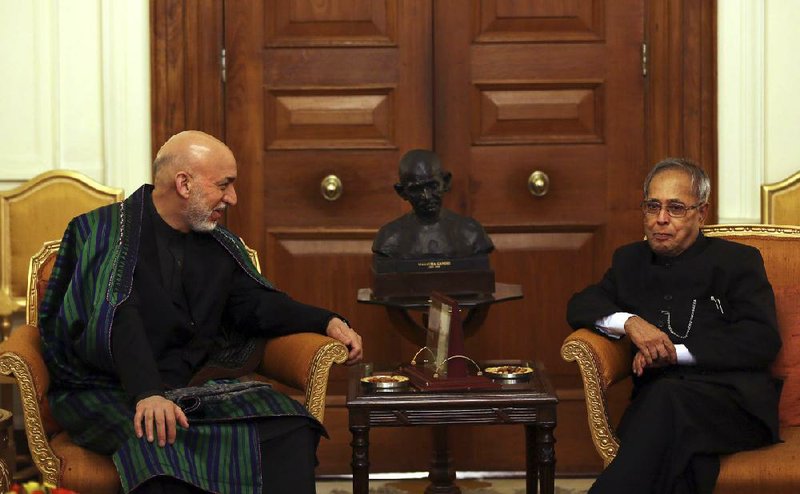KABUL - A coordinated Taliban assault on checkpoints in southern Afghanistan killed four policemen before a counterattack drove the insurgents back, Afghan officials said Tuesday. Also, at least 10 other policemen died in two attacks in the country’s west.
The fierce battle in Helmand province started two nights ago. Omar Zawak, spokesman for the provincial governor, said about 500 insurgents attacked multiple police checkpoints from several directions. A NATO official said that number was greatly overstated, and the Taliban agreed.
Fighting raged for more than a day in the hotly contested Sangin district before police reinforcements arrived from the provincial capital, Lashkar Gar. Police were finally able to beat back the insurgents by Tuesday morning, Zawak said. He said four police were killed and seven wounded, while 26 Taliban were killed, though government forces recovered only three enemy bodies.
The Taliban claimed on Monday night that they had seized six of the checkpoints. By Tuesday afternoon, insurgent spokesman Qari Yousef Ahmadi was no longer making that claim but said that the fighting was not yet over.
Government spokesman Zawak portrayed the successful defense as showing the strength of the Afghan forces, though both the Taliban and the U.S.-led military coalition downplayed the size of the attacking force.
In recent months, the Taliban have launched a fierce offensive against the Afghan government they want to overthrow, unleashing a wave of assassinations and bombings. Their aim is to weaken the government ahead of the pullout of most international troops from the country by the end of next year.
India offered Tuesday to provide more training and reconstruction aid as the troops prepare to withdraw. President Pranab Mukherjee told visiting Afghan President Hamid Karzai that India was proud to help, a statement from Mukherjee’s office said.
India already has invested more than $2 billion in Afghan infrastructure, including highways and hospitals and rural electricity projects. It is also helping the Afghan government rebuild its police forces, judiciary and diplomatic services. Small batches of Afghan soldiers are undergoing training at Indian military schools.
Afghan security forces have been increasingly taking the lead in fighting insurgents, and the current fighting season, called the Taliban’s annual spring offensive, is seen as a crucial test of their capabilities without foreign soldiers fighting alongside them.
In the western province of Herat, a powerful roadside bomb killed six policemen Tuesday morning. Their vehicle hit the explosives buried in the road, an Afghan official said.
Also in the west, a gunman in Farah province opened fire Monday at another police outpost, killing four officers. Provincial government spokesman Abdul Rahman Zhwandai said a Taliban spy posing as afriend of one of the officers killed the four and wounded two others at the checkpoint in Bala Buluk district.
Meanwhile, family members Tuesday found the body of a man missing since last November near the U.S.Special Forces base to which he was last seen being taken, Afghan officials and victims’ representatives said.
Afghan investigators said that after his disappearance, the man, Sayid Mohammad, was seen in a video being abused by an Afghan-American named Zakaria Kandahari, who was the chief translator for a U.S. Army Special Forces A Team stationed at the base in the Nerkh district of Wardak province.
Mohammad’s body was found about 200 yards outside the perimeter of the Nerkh base, which is now occupied by Afghan special forces, because the U.S. unit was removed after protests by Afghan officials, including Karzai.
Relatives of Mohammad said his body was largely intact but both of his feet had been cut off. The partial remains of another missing person were also found near the base, family members and Afghan officials have said.
Afghan officials have said they are seeking Kandahari’s arrest on charges of murder, torture and prisoner abuse, and accuse the U.S. military of shielding him from capture.
U.S. military officials have insisted that they do not have Kandahari and do not know his whereabouts. They also say that military investigations into the disappearances and murders of at least 15 people from Wardak province have shown no wrongdoing by U.S. soldiers. The U.S. military also maintains that Kandahari is an Afghan citizen, not Afghan-American.
Meanwhile, New Yorkbased Human Rights Watch reported Tuesday that the number of Afghan women and girls jailed for “moral crimes” has risen dramatically in the past 18 months, raising concerns that gains in women’s rights might be reversed with the withdrawal of international troops.
The group said 600 females are now detained under charges listed as moral crimes, a catch-all category that covers running away from home and sex outside of marriage. The number of females behind bars has jumped by 50 percent since late 2012, it said.
Information for this article was contributed by Rahim Faiez, Amir Shah, Mirwais Khan, Kay Johnson and Ashok Sharma of The Associated Press and by Rod Nordland of The New York Times.
Front Section, Pages 6 on 05/22/2013

